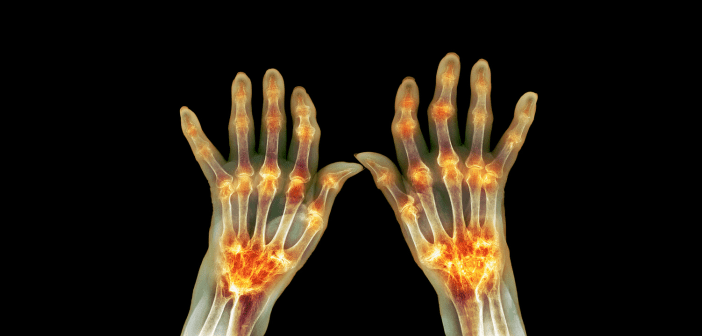Uncovering the unique and complex autoantibody patterns in rheumatoid arthritis

Autoantigen-specific LC–MS-based profiling offers in-depth molecular insights into the autoantibody response that drives rheumatoid arthritis (RA) and sheds new light on improved diagnostics.
Through their work on antigen-binding fragments (Fab) profiling, a group of researchers from the University of Utrecht and Leiden University Medical Center (both Netherlands) have uncovered the complex pattern of autoantibodies in RA patients. Their findings were published in Nature Communications.
RA is a chronic autoimmune condition that mainly impacts the joints, resulting in pain, stiffness and swelling. It occurs when the immune system erroneously targets the body’s tissues, resulting in joint inflammation and possibly affecting other organs.
The precise cause of RA is still unidentified, but autoantibodies—harmful antibodies that target the body’s own tissues—are known to play a significant role. Typically, our immune system possesses a ‘filter’ that eliminates these autoantibodies, however, this process is believed to function abnormally in RA patients.
You may also be interested in:
- In the Zone: smart biomarker assays
- Biomarker context-of-use: how organizational design can impact the implementation of the appropriate biomarker assay strategy
- Challenges and solutions in bioanalysis for oligonucleotide drugs
To investigate the role of autoantibodies in RA, the Dutch research group employed an autoantigen-specific LC–MS method to analyze distinct antibodies found in the blood of RA patients, known as anti-citrullinated protein antibodies (ACPAs). ACPAs are suggested to be highly specific and sensitive biomarkers for early RA diagnosis.
In their analysis of eight patients diagnosed with ACPA-positive RA, it was found that each RA patient had a distinct and varied collection of ACPAs. Identifying Fab revealed that these diverse antibodies were predominantly comprised of a small number of antibody clones. These findings challenge previous beliefs about RA backgrounds, emphasizing the overlooked diversity and complexity of the antibodies at play.
“This shows that RA is not just a disease occurring due to small errors, but a big structural problem in the immune system,” explained Albert Bondt, the lead scientist of this research.
Moreover, the group found that these ACPAs are harbored with sugar molecules called Fab glycans. Interestingly, some antibodies had multiple sugar molecules attached. This differs from the usual antibody profiles researchers observe.
Bondt hypothesized that ‘having extra glycans aboard may help the ACPA antibodies pass the filter of the immune system’ in RA patients. He speculated that glycans might enable ACPAs to bypass the control system, enabling them to evade detection and potentially trigger the onset of RA.
These results suggest that ACPA Fab glycosylation could predict RA progression from symptom-free autoimmunity to autoimmune disease. This indicates Fab glycosylation’s significance as a diagnostic and prognostic biomarker in understanding autoantibody responses in RA and other autoimmune conditions.
“When more molecular details about RA-related antibodies are uncovered, the disease may be diagnosed in an earlier stage. Even though RA remains an incurable disease, with an earlier diagnosis you can take better measures to control its progression,” commented Bondt.




